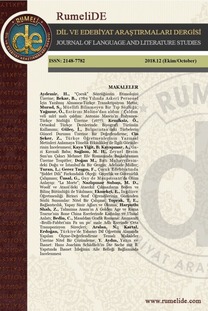Maya kökenli Guatemalalı şair Humberto Ak’abal’ın Şiirlerinde Şiirsel Öznenin ‘Ses’i : Oralitura’dan Literatura’ya
Maya kökenli Guatemalalı şair Humberto Ak’abal’ın Şiirlerinde Şiirsel Öznenin ‘Ses’i: Oralitura’dan Literatura’ya Bu çalışma Maya kökenli Guatemalalı şair Humberto Ak’abal’ın şiirlerinde, şiirsel öznenin kendini ifade edişi üzerinden ‘oralitura’’dan ‘literatura’’ya geçişin sancılı sürecine bir yaklaşım olacaktır. Çift dilli bir şair olan Humberto Ak’abal’, anadili olan Maya-K’iche’ dili ile beraber İspanyolca konuşur. Eserlerini Maya-K’iche’ dilinde yazan ve kendisi İspanyolca’ya çeviren şairin çok sayıda şiir kitabı vardır. Bu eserler yirmiden fazla dile çevrilmiştir. Başta, El Premio Continental Canto de América (UNESCO,1998) olmak üzere Amerika ve Avrupa’da sayısız ödül alan, Çağdaş Yerli Edebiyatı’nın en önemli isimlerinden biri olarak kabul edilen şair, yapıtlarında Maya kültürünün sözel mirasını yazılı kültüre aktarır. ‘Oralitura’ ile ‘literatura’ arasında yazılan bu şiirler, her iki kültürü de bünyesinde barındıran şiirsel öznenin kendini ifade ettiği alandır. Bu doğrultuda çalışmamız, Humberto Ak’abal’ın şiirlerinde, şiirsel öznenin ifadesi üzerinden Yerli’nin sözel kültürünün (oralitura), Beyaz Adam’ın yazılı kültürüne (literatura) geçerken her iki kültürün dünyayı farklı algılama biçimine ve ‘beyaz Adam’ın sömürgeci anlayışı yüzünden yaşanılan sancılı sürece tanıklık etmek ve yeniden anlamlandırmak üzerine bir yaklaşım olacaktır. Bunu yaparken XX. yüzyıldan itibaren tarihsel süreç içinde Latin Amerika Yerli Edebiyatı’nın yeri ve önemi belirlenerek Ak’abal’lın şiirlerinde ‘neo indigenista’ unsurlar saptanacak İspanyolca’dan Türkçe’ye yaptığımız çevirilerle örneklendirilecektir. Çalışmamızın çıkış noktasını Ak’abal’ın şiirleri ve düşünceleri ile Latin Amerika Yerli Edebiyatı üzerine çalışan uzman ve akademisyenlerin görüşleri oluşturacaktır.
Anahtar Kelimeler:
Humberto Ak’abal’, ’Literatura indigenista’, ‘Oralitura’, ‘Poesia Indigena’, Maya Kültürü
The 'Voice' of Poetic Subject in the Poems of the Mayan-origin Guatemalan poet Humberto Ak'abal: From Oralitura to Literatura
This study offers an approach to the painful transition process from Oralitura to Literatura through the poetic subject's self-expression in the poems of the Mayan-origin Guatemalan poet Humberto Ak'abal. As a bilingual poet, Humberto Ak'abal speaks both Spanish and his native language, Maya-K'iche'. Writing his works in the Maya-K'iche' language and translating them into Spanish, the poet has multiple poetry books and these works are translated into more than twenty languages. Having received numerous awards in America and Europe, especially El Premio Continental Canto de América (UNESCO,1998), and recognized as one of the most important names of Contemporary Latin American Indigenous Literature, the poet transfers the oral heritage of Mayan culture to written culture in his works. These poems, written in-between oralitura and literatura, are the space where the poetic subject that includes the two cultures expresses itself. Accordingly, through the expression of poetic subject in Humberto Ak'abal's poems, our study is an approach to witness and re-interpret the painful process caused by the colonialist mindset of the White Man and the differences between the two cultures in their perception of the world while transitioning from the oral culture of the Native (oralitura) to the written culture of the ‘white man’ (literatura). While doing so, by determining the place and importance of Latin American Indigenous Literature in the historical process from the 20th century onwards, neo-indigenous elements in Ak'abal's poems are determined and exemplified with translations from Spanish to Turkish. The starting point of this study is the poems and thoughts of Ak'abal and the opinions of experts and academics studying Latin American Indigenous Literature.
___
- Aibar Ray, Elena (1992). Identidad y resistencia cultural en las obras de José María Arguedas, Lima: Pontifica Universidad Catolica del Peru.
- Ak’abal, Humberto (1994). Guardían de la caída de agua, Guatemala: Serviprensa Centroamericana Guatemala C.A.
- Ak’abal, Humberto (1998). Ajkem Tzij. Tejedor de palabras, México: Prasis.
- Ak’abal, Humberto (2000). Saq’irisanik/cielo amarillo, Malaga: Servicio de Publicacines Centro de Ediciones de la Diputación de Málaga.
- Ak’abal, Humberto (2009). Las palabras crecen, Sevilla: Sibilina SLU.
- Arteaga, José M. Cabrales (1982). Literatura hispanoamericana: siglo XX, Madrid: Editorial Playor.
- Astvaldsson, Astvaldur (2012). “Traducir la cultura, Reflexiones sobre la obra y el bilingüismo de Humberto Ak’abal, Revista semestral de la Cátedra de Lengua y Literaturas Hispanoamericanas Università Cattolica del Sacro Cuore, Milano: EDUcatt http://www.centroamericana.it (27.07.21)
- Chalk, Gabriel Torres (2010). Entrevista, Humberto Ak’abal, 7 Marzo, www.masacalli.com (28.07.2021)
- Gayol, Carlos Pallán (2017). Breve historias de los Mayas, Madrid: Nowtilus.
- Juan Guillermo, Sánchez M., (2012). “Con acote ardiendo”:memoria k’iche’ en la poesía de Humberto Ak’abal”, Revista de Literaturas Populares. Universidad Nacional Autónoma de México. Año XII, número 1, enero-junio de 2012.
- Kutlu, Mehmet Necati (2004). Tılsımdan inanca, Başlangıçtan XVII. Yüzyıla kadar Latin Amerika Edebiyatı, İstanbul: Cadde Yayınları.
- Oviedo, José Miguel (2001). Historia de la literatura hispanoaamericana 4. De Borges al presente, Madrid: Alianza.
- Palma, Francisco Albizúrez (1994). La poesía nueva en el mundo hispánico, los ultimos años, Madrid: Visor (ss.195-205).
- Sánchez, Juan (2014). “Nativos, migrantes: poesía en la encrucijada” Electronic Thesis and Dissertation Repository, 2107. https://ir.lib.uwo.ca/etd/2107 (25.07.2021)
- Trigo, Pedro (1982). Arguedas. Mito, historia y religión, Lima: CEP-Centro de Estudios y Publicaciones.
- ISSN: 2148-7782
- Yayın Aralığı: Yılda 6 Sayı
- Başlangıç: 2014
- Yayıncı: Yakup YILMAZ
Sayıdaki Diğer Makaleler
Mehmet Rauf’un Menekşe’sinde Servet-i Fünûn Nesli
COVID-19 Salgını Sürecinde Yükseköğretimde Türk dili ve edebiyatı eğitimi
Halide Gamze İNCE YAKAR, Özlem FEDAİ
İngilizce bölümlerinde okul dışında dile maruz kalma
Sevdenur KÜÇÜKLER, Sofia SULAC, Halil KÜÇÜKLER
Yüksel Kocadoru’nun “Şehirler” Adlı şiirinin çevirisinde başvurulan çeviri stratejileri
Klasik Türk şiirinde bir hat terimi olarak “hil’at”
Türk yazılı basınında COVID-19 terimleri: Sorunlar ve çözüm önerileri
Mülteci konulu Türkçe ve çeviri çocuk kitaplarında yer alan empati ögelerinin incelenmesi
Eski Türkçenin söz varlığında tanıklanan ıçgın- ve örgin sözcüklerinde geçen {-gI-} eki
